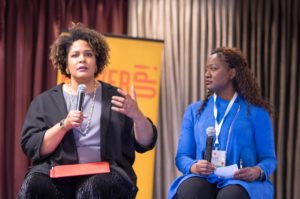We asked WA Women’s Fdn Board member Patricia Kiyono to share her reflections from the PowerUP! Conference. Patricia has been a member of WA Women’s Foundation since 2014 and has served on the Pooled Fund, Partner Grant, Impact Assessment, and Intersect Planning Committees as well as Cabinet.

In social isolation at home, I am recalling three days of social connection in mid-February, when nearly 400 women philanthropists from around the country convened for the PowerUP! Conference in downtown Seattle. Hosted by Washington Women’s Foundation, the Conference brought together members of the national network of women’s grantmaking collectives (now known as Philanos) to explore the theme of increasing equity and reducing disparities.
PowerUP! was my first network Conference. I hadn’t realized Washington Women’s Foundation was the founding mother of the women’s collective giving network, now comprising more than 75 affiliates. Sister philanthropists from Philadelphia, Cincinnati, Richmond, Miami, Austin, and elsewhere described how their regional models resemble ours, though many award smaller grants. Members vote on community grants determined through a competitive application process. Also similar are the funding categories: culture, education, health, and environment. I heard about grants to after-school programs, women’s shelters, and food banks.
To launch candid discussions, Conference organizers urged attendees to consider “how systemic racism, privilege, and implicit bias have held back our sector’s good intentions and perpetuated the very inequities we seek to address.” I had modest expectations for how people might respond. Stories of good intentions would not be a surprise, but would regional affiliates report serious work toward social equity? Then, in conversations with attendees from the Midwest, East, and South, I learned Impact 100 chapters have established equity cohorts and sponsorships. Giving circles are funding initiatives for women and girls of color. And boards are investing in diversity, equity, and inclusion training.
Speakers challenged attendees to absorb hard truths about ingrained racism and exclusion. White attendees who asked how to diversify their boards were encouraged to first change their culture from within. Women of color noted the importance of having a Board of Directors fully committed to diversity, equity, and inclusion, on both the personal and organizational levels. Attendees were advised, “you don’t ask people to assimilate; you invite them to belong.”
In her keynote, Tricia Raikes revealed how she had to educate herself about white privilege (she recommends Waking up White, by Deborah Irving). Merf Ehman, Executive Director of Columbia Legal Services, shared a forceful video on slavery and social justice. Vashti Rutledge, formerly with the Family Independence Initiative in Cincinnati, called for us to blow up unjust systems that even mega-funders can’t fix. As she put it, “If people built it wrong, people can make it right.”
The emerging concept of trust-based philanthropy surfaced as a powerful idea to take away. In an era of urgent need (even preceding the COVID-19 crisis), we can’t waste time on old practices of competitive restricted granting, according to Vu Le, former Executive Director of Rainier Valley Corps, and Pia Infante, Co-Executive Director of the Whitman Institute. Foundations can approach communities as peers and trade RFPs for RFCs — replace Requests For Proposals with Requests For Conversations. They exhorted the women in the room to shift the burden from nonprofits to funders. It’s time to do our own homework, and, while you are at home, staying safe and well, I encourage you to access the resources and readings on the PowerUP! Conference website.